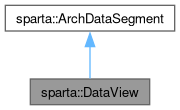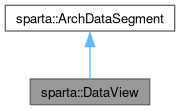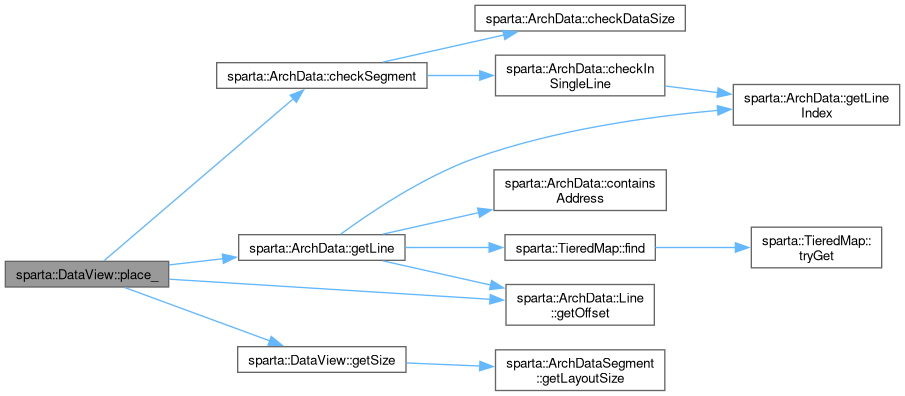View into a backend block of memory in an ArchData. More...
#include <DataView.hpp>


Public Types | |
| typedef ArchDataSegment::offset_type | offset_type |
| Represents offset into ArchData. | |
| typedef ArchDataSegment::ident_type | ident_type |
| DataView identifiers (distinguishes views in the same ArchData) | |
| typedef uint32_t | index_type |
| Type used for specifying index into this DataView during a read or write. | |
 Public Types inherited from sparta::ArchDataSegment Public Types inherited from sparta::ArchDataSegment | |
| typedef uint64_t | offset_type |
| typedef uint32_t | ident_type |
Public Member Functions | |
| DataView (ArchData *data, ident_type id, offset_type size, ident_type subset_of=INVALID_ID, offset_type subset_offset=0, const uint8_t *initial_buf_le=nullptr) | |
| Construct a DataView. | |
| ArchData * | getArchData () const |
| offset_type | getSize () const |
| offset_type | getOffset () const |
| ArchData::Line * | getLine () const |
| Get already-placed line. | |
| ident_type | getID () const |
| template<typename T , ByteOrder BO = LE> | |
| T | read (index_type idx=0) const |
| Reads a value from this DataView at the specific index. | |
| template<typename T , ByteOrder BO = LE> | |
| T | readUnsafe (index_type idx=0) const |
| Same behavior as read but without checking access bounds. | |
| template<typename T , ByteOrder BO = LE> | |
| T | readPadded (index_type idx=0) const |
| Reads a value from this DataView using a type T which might be larger than the dataview. | |
| template<typename T , ByteOrder BO = LE> | |
| T | readPaddedUnsafe (index_type idx=0) const |
| Same behavior as readPadded but without checking access bounds. | |
| template<typename T , ByteOrder BO = LE> | |
| void | write (T val, index_type idx=0) |
| Writes a value to this DataView at the specific index. | |
| template<typename T , ByteOrder BO = LE> | |
| void | writeUnsafe (T val, index_type idx=0) |
| Same behavior as write but without checking access bounds. | |
| template<typename T , ByteOrder BO = LE> | |
| void | writeTruncated (T val, uint32_t idx=0) |
| Writes value from this DataView using a type T which might be larger than the size of the DataView. | |
| template<typename T , ByteOrder BO = LE> | |
| void | writeTruncatedUnsafe (T val, uint32_t idx=0) |
| Same behavior as writeTruncated bout without checking access bounds. | |
| DataView & | operator= (const DataView &rhp) |
| Reads data from another dataview and writes that value to this DataView. | |
| std::string | getByteString () const |
| Dump data in this DataView as hex bytes in address order with a space between each pair. | |
| template<ByteOrder BO = LE> | |
| std::string | getValueAsString () const |
| Reads the value of this DataView and renders as a string in the specified Byte-Order as a prefixed hex number with zero-padding. (e.g. 0x00c0ffee). | |
 Public Member Functions inherited from sparta::ArchDataSegment Public Member Functions inherited from sparta::ArchDataSegment | |
| ArchDataSegment (const ArchDataSegment &)=delete | |
| ArchDataSegment (const ArchDataSegment &&)=delete | |
| ArchDataSegment & | operator= (const ArchDataSegment &)=delete |
| ArchDataSegment (ArchData *data, offset_type size, ident_type id, ident_type subset_of=INVALID_ID, offset_type subset_offset=0) | |
| Constructor. | |
| virtual | ~ArchDataSegment () |
| Virtual destructor. | |
| void | place (offset_type offset) |
| Sets the offset of this DataView within its ArchData then invokes the place_ method for subclasses to handle. | |
| void | writeInitial () |
| Invokes writeInitial_, giving subclasses a chance to write a value to memory during initialization or reset of an ArchData. | |
| bool | isPlaced () const |
| Has this segment been placed yet. | |
| offset_type | getOffset () const |
| Gets the offset of this segment once placed. | |
| offset_type | getLayoutSize () const |
| Gets the layout size of this segment (number of bytes) | |
| ident_type | getLayoutID () const |
| Gets the layout Identifier of this segment. | |
| ident_type | getSubsetOf () const |
| Gets the segment of which this segment is a subset. | |
| offset_type | getSubsetOffset () const |
| Gets the offset into the segment of which this segment is a subset. | |
| ArchData * | getArchData () |
| Gets the ArchData associated with this segment. | |
| const ArchData * | getArchData () const |
| Gets the ArchData associated with this segment. | |
Static Public Attributes | |
| static const std::string | DATAVIEW_UNPLACED_STR |
| String to show instead of a value when representing an unplaced dataview. | |
| static const ident_type | INVALID_ID |
| Invalid Identifier constant for a DataView. | |
 Static Public Attributes inherited from sparta::ArchDataSegment Static Public Attributes inherited from sparta::ArchDataSegment | |
| static const ident_type | INVALID_ID = ~(ident_type)0 |
| Indicates an invalid ID for an ArchDataSegment or any refinement. | |
Protected Member Functions | |
Inherited from ArchDataSegment | |
| virtual void | place_ (offset_type offset) override |
| Places this DataView within its ArchData. | |
| virtual void | writeInitial_ () override |
| Writes the initial value of this DataView into memory. This is guaranteed to be called after placement. | |
 Protected Member Functions inherited from sparta::ArchDataSegment Protected Member Functions inherited from sparta::ArchDataSegment | |
Detailed Description
View into a backend block of memory in an ArchData.
- Note
- Can be a subset of another DataView. ArchDataSegment provides the layout inteface Noncopyable because of ArchDataSegment. Could be made copyable if ArchDataSegment were also copable.
Definition at line 27 of file DataView.hpp.
Member Typedef Documentation
◆ ident_type
| ArchDataSegment::ident_type sparta::DataView::ident_type |
DataView identifiers (distinguishes views in the same ArchData)
Definition at line 32 of file DataView.hpp.
◆ index_type
| uint32_t sparta::DataView::index_type |
Type used for specifying index into this DataView during a read or write.
Definition at line 33 of file DataView.hpp.
◆ offset_type
| ArchDataSegment::offset_type sparta::DataView::offset_type |
Represents offset into ArchData.
Definition at line 31 of file DataView.hpp.
Constructor & Destructor Documentation
◆ DataView()
|
inline |
Construct a DataView.
- Parameters
-
data Data which this view will access. Must not be nullptr id ID of this DataView (as an ArchDataSegment) size size of <data> accessed by this view. Must be a power of 2 greater than 0. This is validated by ArchDataSegment subset_of ID of another DataView of which this is a subset (occupies only a subset of the other dataview's space). subset_offset Offset in bytes within the dataview indicated by subset_of initial_buf_le Buffer from which initial value will be copied byte-by-byte from a little-endian byte array source. Therefore, bytes could be swapped if Sparta is run (if supported) on a BE architecture. The result should be that hand-coded intitial_buf byte-arrays needn't be updated during such changes. This pointer must be nullptr or contain a number of bytes >= size. The pointer must be valid at least until DataView::place is called during initialization
- Note
- Subsets relationships might not be validated at construction. Invalid subset relationships might only be tested at ArchData layout-time. This means that a DataView which is larger than another DataView of which it is declared a subset will not cause an error until layout-time (see layout).
Definition at line 72 of file DataView.hpp.

Member Function Documentation
◆ getArchData()
|
inline |
- Returns
- The ArchData object this view is associated with
Definition at line 106 of file DataView.hpp.
◆ getByteString()
|
inline |
Dump data in this DataView as hex bytes in address order with a space between each pair.
- Precondition
- This view must have been placed (isPlaced())
Example for a 16bit DataView:
Definition at line 355 of file DataView.hpp.

◆ getID()
|
inline |
- Returns
- The layout ID
Definition at line 118 of file DataView.hpp.

◆ getLine()
|
inline |
Get already-placed line.
- Returns
- The line that is viewed into the ArchData
Definition at line 115 of file DataView.hpp.
◆ getOffset()
|
inline |
- Returns
- The offset of the memory within the ArchData
Definition at line 112 of file DataView.hpp.
◆ getSize()
|
inline |
- Returns
- The size of this view
Definition at line 109 of file DataView.hpp.

◆ getValueAsString()
|
inline |
Reads the value of this DataView and renders as a string in the specified Byte-Order as a prefixed hex number with zero-padding. (e.g. 0x00c0ffee).
- Precondition
- This view must have been placed (isPlaced())
- Returns
- String of contained data read in the specified endianness
- Template Parameters
-
BO ByteOrder in which to read the value of this DataView
Definition at line 375 of file DataView.hpp.

◆ operator=()
Reads data from another dataview and writes that value to this DataView.
- Precondition
- rhp and this must have same size
- Dataviews must be placed. See DataView::isPlaced
- Exceptions
-
SpartaException if dataviews have different size
- Note
- This method performs no re-ordering since endianness is a property of data-access and not data storage.
Definition at line 327 of file DataView.hpp.

◆ place_()
|
inlineoverrideprotectedvirtual |
Places this DataView within its ArchData.
- Postcondition
- Writes initial value if specified at construction
- Parameters
-
offset Offset into <data>
- Todo
- Store pointer directly to value to save an add in offset
Reimplemented from sparta::ArchDataSegment.
Definition at line 408 of file DataView.hpp.

◆ read()
|
inline |
Reads a value from this DataView at the specific index.
- Template Parameters
-
T type of value to read. Should be [u]intNN_t. See sparta::ArchData::Line::read specializations for supported types. BO sparta::ByteOrder describing read byte-order.
- Parameters
-
idx Index offset within this DataView from low memory address in the DataView. Index refers to multiples of sizeof(T). This is used for reading the content of the DataView as smaller values. For example, a 128b DataView can be read as two uint64_t values by calling read<uint64_t, LE>(0), read<uint64_t, LE>(1). The caller would then be responsible for performing 128b operations using these two values.
- Returns
- The read value interpreted as the appropriate byte-order from memory referenced by this DataView.
- Note
- May generate assertion if read size is invalid. These assertions should be disabled in optimized mode for performance.
- sizeof(T)*index + sizeof(T) must be less than getSize().
- Precondition
- This view must have been placed (isPlaced())
Example:
Definition at line 150 of file DataView.hpp.

◆ readPadded()
|
inline |
Reads a value from this DataView using a type T which might be larger than the dataview.
- See also
- sparta::DataView::read
- Parameters
-
idx Index at which to read to this view in terms of multiples of sizeof(T)
- See also
- read
- Precondition
- This view must have been placed (isPlaced())
A good example usage is T=uint64_t, getSize()=4, and idx_=0
Definition at line 180 of file DataView.hpp.

◆ readPaddedUnsafe()
|
inline |
Same behavior as readPadded but without checking access bounds.
- Note
- This exists to avoid redundancy if higher-level functions are already checkint the access bounds
Definition at line 194 of file DataView.hpp.

◆ readUnsafe()
|
inline |
Same behavior as read but without checking access bounds.
- Note
- This exists to avoid redundancy if higher-level functions are already checkint the access bounds
Definition at line 163 of file DataView.hpp.

◆ write()
|
inline |
Writes a value to this DataView at the specific index.
- Parameters
-
val The value to write of type T
- Template Parameters
-
T type of value to write. Should be [u]intNN_t. See sparta::ArchData::Line::read specializations for supported types. BO sparta::ByteOrder describing read byte-order.
- Parameters
-
idx Index offset within this DataView from low memory address in the DataView. Index refers to multiples of sizeof(T). This is used for writing to the content of the DataView as smaller values. For example, a 128b DataView can be written as two uint64_t values by calling write<uint64_t, LE>(val1, 0), write<uint64_t, LE>(val2, 1). The caller would then be responsible for performing representing the 128b value before writing to the register.
- Returns
- The write value stored into memory using the appropriate byte-order from memory.
- Note
- May generate assertion if read size is invalid. These assertions should be disabled in optimized mode for performance.
- sizeof(T)*index + sizeof(T) must be less than getSize().
- Precondition
- This view must have been placed (isPlaced())
Example:
Definition at line 245 of file DataView.hpp.

◆ writeInitial_()
|
inlineoverrideprotectedvirtual |
Writes the initial value of this DataView into memory. This is guaranteed to be called after placement.
Reimplemented from sparta::ArchDataSegment.
Definition at line 418 of file DataView.hpp.

◆ writeTruncated()
|
inline |
Writes value from this DataView using a type T which might be larger than the size of the DataView.
- See also
- sparta::DataView::read
- Parameters
-
val Value to write. This may contain more set significant bytes than than the number of bytes available in this view following the chosen idx idx Index at which to write to this view in terms of multiples of sizeof(T)
- Precondition
- This view must have been placed (isPlaced())
Truncates most signficant bits from val if larger than the number of bytes which can be written at idx.
A good example usage is T=uint64_t, getSize()=4, and idx_=0
Definition at line 283 of file DataView.hpp.

◆ writeTruncatedUnsafe()
|
inline |
Same behavior as writeTruncated bout without checking access bounds.
- Note
- This exists to avoid redundancy if higher-level functions are already checking the access bounds
- Still checks access size for sanity (i.e. positive integer power of 2 and <= 8)
Definition at line 300 of file DataView.hpp.

◆ writeUnsafe()
|
inline |
Same behavior as write but without checking access bounds.
- Note
- This exists to avoid redundancy if higher-level functions are already checking the access bounds
Definition at line 260 of file DataView.hpp.

Member Data Documentation
◆ DATAVIEW_UNPLACED_STR
|
static |
String to show instead of a value when representing an unplaced dataview.
Definition at line 39 of file DataView.hpp.
◆ INVALID_ID
|
static |
Invalid Identifier constant for a DataView.
Definition at line 27 of file ArchDataSegment.hpp.
The documentation for this class was generated from the following file:
- /github/workspace/sparta/sparta/functional/DataView.hpp